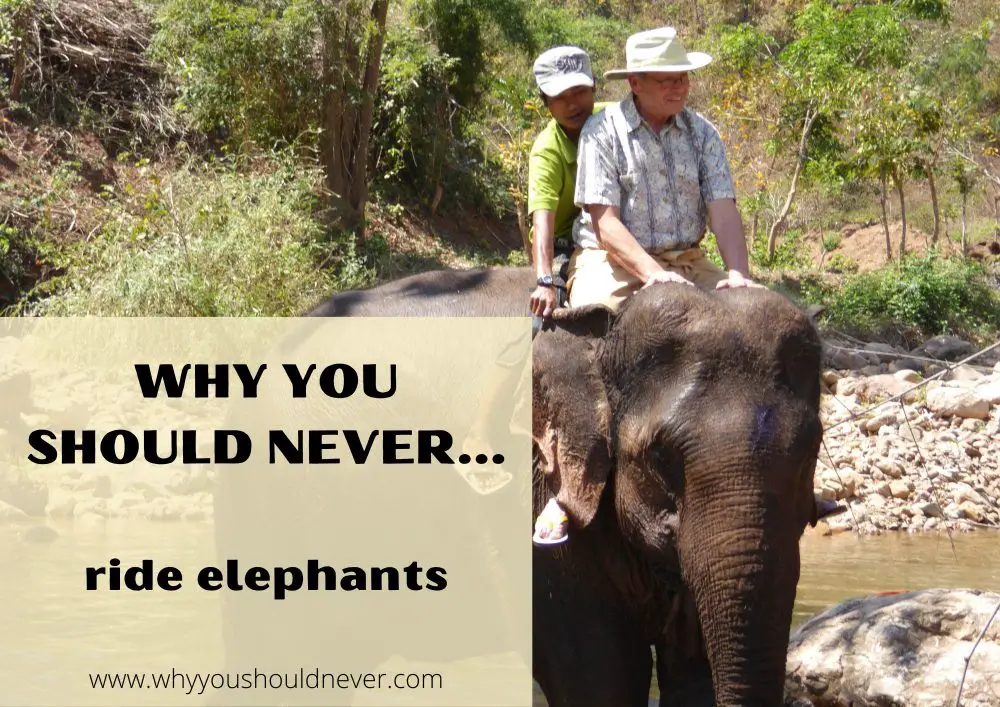![]()
Why You Should Never Ride Elephants
What’s not to love about elephants? They’re majestic, intelligent, and have been known to mourn their dead. Plus, they’re pretty darn cute. So, it’s no wonder that many people dream of riding an elephant, especially while on vacation in exotic destinations.
We ride horses, camels, donkeys, even llamas, so why not elephants? Well, stick around, because I’m about to break it all down for ya.
8 reasons why you shouldn’t ride elephants
1. It’s cruel to the elephant
Elephants are not domesticated animals like horses, and they’re not built to carry heavy loads on their backs. Just because they’re the size of, erm, elephants, doesn’t mean they’re meant to be ridden. By riding them, you’re putting extra pressure on their spines, which can lead to severe back problems.
To add to that, elephants have to be “broken” before they can be ridden, meaning they go through a traumatic process of being separated from their mothers, tied up, and beaten until they comply with human commands. In Thailand, this process is called “phajaan,” and it’s incredibly painful for the elephant.
2. It’s dangerous for the rider
Elephants are wild animals, and no matter how well-trained they are, they can still be unpredictable. Even though they’re known for their placidity, like any distressed animal, they’re capable of sudden, violent outbursts, which can be dangerous for the rider.
Elephants have also been known to trip or stumble while carrying riders, which can, naturally, result in serious injuries for the person unlucky enough to be on their backs.
3. It’s unethical
Riding elephants is often part of the tourism industry, and many of these elephants are kept in poor conditions. They’re often subjected to long hours of work, and are forced to carry tourists in the hot sun, with little access to water or rest.
Furthermore, elephants are social animals, and by taking them away from their herds, we’re depriving them of the opportunity to interact with their own kind. Elephants need to roam free and be with their families, just like we do.
4. Your fall will be great
After giraffes, elephants are the tallest animals on the planet. They range in height from 10 – 13 feet; so, if you take a tumble from the top of one, you’re going to have quite the fall. Even if you’re wearing a helmet or other protective gear, it won’t be enough to protect you from serious injuries.
5. It’s not culturally sensitive
In some cultures, elephants are considered sacred, and riding them is seen as disrespectful.
Take India, for example, where elephants are revered as religious symbols, and riding them is discouraged.
In Thailand, where elephant riding is a popular tourist activity, there’s been a recent push to end the practice, as people become more aware of the cruelty involved.
6. The elephant didn’t give you permission
All right, so this might sound absurd, but hear me out.
Animals don’t have the ability to give consent, so they’re unable to communicate whether they’re comfortable with being ridden or not. Therefore, it’s up to us, as humans, to make ethical decisions on their behalf.
Just because we can do something, doesn’t mean we should. Riding an elephant is a prime example of this.
7. There are better ways to interact with elephants
If you’re looking to have an up-close and personal experience with elephants, there are plenty of ethical ways to do so.
For example, visiting an elephant sanctuary or volunteering at one is a great way to see these magnificent creatures up close, while also supporting their welfare. You can observe them in their natural habitat, help to feed them, or even bathe them.
Another option is to watch them from afar, in their natural habitat. You can take a guided tour or go on a safari to see elephants in the wild. This allows you to witness these animals in their natural environment, without causing them harm.
8. It’s unnecessary
At the end of the day, riding an elephant just isn’t necessary. It’s not essential for our survival, and it doesn’t benefit elephants in any way.
Conclusion
We all have our opinions about riding animals. For me, I’m against the riding of any animals, but I definitely draw the line at riding elephants. Yes, elephants have been ridden for centuries by the natives of Asian and African countries, but the riding was never commercialized until now.
Times have changed, and we now know better. We know that riding elephants is cruel, dangerous, and unethical. We know that elephants are not meant to carry heavy loads on their backs, and that they’re wild animals that deserve to be treated with respect and dignity.
So, let’s leave the elephants to roam free in their natural habitats, and let’s find other ways to appreciate their beauty and majesty.
